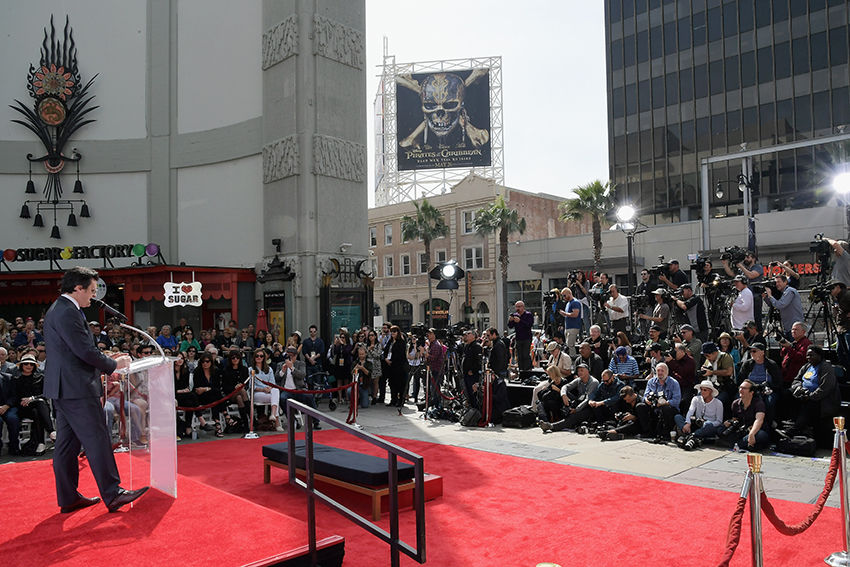Classic movie devotees descended in droves from every U.S. state to Hollywood in early April to watch old films many have enjoyed since childhood. For the most part, they’ve likely seen these tales in celluloid only on television or via their computer or smartphone screens. They’ve seldom, if ever, been able to enjoy them as they were first presented: shown on a big screen for audiences in a theater.
To remedy that lapse, for the past eight years Turner Classic Movies (TCM) has sponsored classic film festivals. Memorable movies, often restored to pristine condition, are presented at two of the last remaining “cathedrals” of film in Hollywood: the TCL Chinese (formerly known as Grauman’s) and the Egyptian theaters, along with the Cinerama Dome on Sunset Boulevard, and at a few other venues convenient to the festival headquarters, including the Hollywood Roosevelt Hotel.
This year’s theme — “Make ‘Em Laugh: Comedy in the Movies” — struck a bittersweet note due to the recent death of Robert Osborne, the network’s genial original primetime host, whose storehouse of history and film lore was second to none. During the April 5 press conference on the first day of the four-day film festival, Osborne’s loss was tempered with discussion of the network’s future plans by Jennifer Dorian, Charlie Tabash, Genevieve McGillicuddy and other network executives, along with TCM’s other primetime host, Ben Mankiewicz.
Aside from the many films and other special presentations TCM provides, I accidently discovered an event not part of the network’s official proceedings. This unofficial event is organized each year by a pretty, blonde and outgoing young lady named Kelly J. Kitchens, who is from Dallas, Texas.
Realizing that, due to the costs involved, many film aficionados travel to the festival alone, Kelly decided to bring together people who enjoy old movies as much as she does. “I invite some 1,200 people now,” she said, “and this party helps them meet other folks who love these films. It gives them a sense of family and companionship.”
Indeed, throughout the four days of the festival good-natured banter pervaded the Roosevelt Hotel, with graying baby boomers joining in conversation with younger Gen Xers and even millennials, assessing the relative comedic merits of films starring Carole Lombard or Claudette Colbert, John Barrymore or W. C. Fields, the Marx Brothers or Laurel and Hardy.
Comedy can take place even when not planned. Illustrating this point, at the informal welcoming party on the opening day of the festival, still-glamorous leading lady Barbara Rush regaled the crowd with an event that took place during the shooting of the film “Hombre” (1967). Director Martin Ritt had insisted that she, along with well-known actors Fredric March, Paul Newman, Richard Boone and Martin Balsam, ride a rickety stagecoach downhill without a driver.
“The director assured us it was safe, but halfway down the hill, Dick Boone looked out the window and saw the wheels were about to slip off the road. We all quickly jumped out just before the coach tumbled down the side of the hill. As shaken as I was,” Miss Rush laughed, “all I could think of was: ‘I’m nobody. With all those famous actors gone, who would have known or cared that I had died?’”
At this same get-together, I was honored that Kelly introduced me to Monika Henreid, daughter of the late great actor and director, Paul Henreid, so well-remembered as Victor Laslo in “Casablanca” (1942). She, in turn, was delighted at my appreciation for her father’s work in one of the most magnificent films ever produced, “Goodbye Mister Chips” (1939), his tongue-in-cheek swashbuckler “The Spanish Main” (1945), as well as his directing the sordid Bette Davis thriller “Dead Ringer” (1964), in which Miss Henreid herself had a small role.
Kelly’s remarks, and the festival’s theme of laughter and comedy, reminded me that amid solemn events and sorrowful moments, the Four Evangelists record several flashes of divinely humorous situations.
Those who truly love Jesus enjoy being preposterously humorous, seeing how Christ turned the world topsy-turvy with the gift of redemption from sin. Among others, St. Francis of Assisi, St. Philip Neri and St. John Bosco attracted adults and children to experience Jesus through laughter, jokes and hilarity.
There are elements of absurdist comedy in back of the Incarnation: providing for gestation in the womb of a virgin, the Almighty God enters human history as a powerless infant. With mirthful wit, the God-man is born in a town named Bethlehem, in Hebrew, “House of Bread.” Indeed, a manger — a feeding trough for animals — is the first crib for the one who will call himself the “bread of life.”
Several of Jesus’ parables are full of humor. Do you light a lamp only to hide it under a basket? A crafty steward, fired from his post, rearranges his employer’s accounts by giving steep discounts to the man’s debtors, sure that they will do right by him.
Despite their hearing so many reports of his resurrection, the risen Jesus has to bid the apostles, sure that he must be a specter, “Handle me and see! A ghost does not have flesh and bones, as you can see I have” (Luke 24:39). Some people need empirical evidence, you know.
The resurrection of Jesus Christ is a smile from God, a pledge of redemption and promise of everlasting life. This wondrous event allows Christians to laugh in the face of death.
And this gift of laughter comes from God, whose eternal joy is the goal of every Christian.
Sean M. Wright is a member of Our Lady of Perpetual Help parish in Santa Clarita. He presents workshops and enrichment courses on Catholic topics at parishes throughout the Los Angeles Archdiocese.

